Truth seeking plays a crucial role in enhancing mindfulness, resilience, and bio-hacking success. It fosters curiosity, open-mindedness, and critical thinking, which are essential for personal growth. This article explores how truth seeking influences emotional regulation, adaptability, and the effective adoption of bio-hacking techniques. Practical steps for cultivating truth seeking will also be discussed to support holistic well-being.
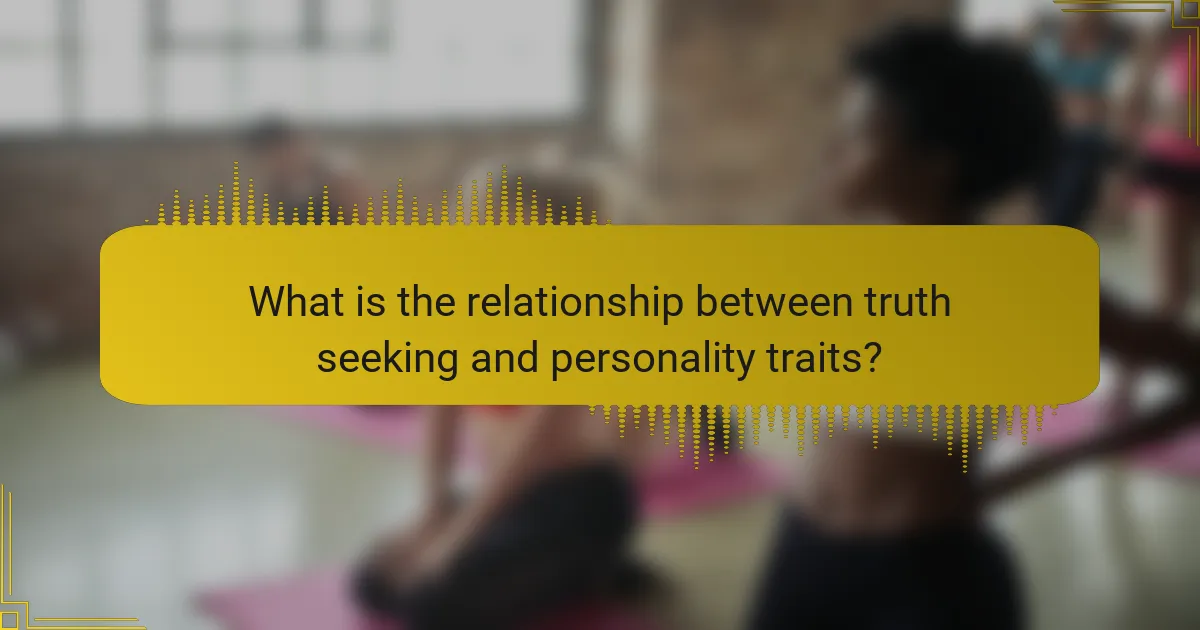
What is the relationship between truth seeking and personality traits?
Truth seeking significantly influences personality traits such as mindfulness, resilience, and bio-hacking success. Individuals who prioritise truth seeking often exhibit higher levels of openness and curiosity, which enhance their capacity for mindfulness. This trait allows them to engage deeply with their experiences, promoting resilience in the face of challenges. Furthermore, truth seekers are more likely to adopt bio-hacking techniques effectively, as they rely on evidence-based practices to optimise their health and performance. Research indicates that these connections are rooted in the unique attribute of truth seeking, linking it directly to personal growth and adaptive functioning.
How does truth seeking influence mindfulness practices?
Truth seeking significantly enhances mindfulness practices by fostering self-awareness and clarity. Individuals who prioritise truth seeking are more likely to engage deeply with their thoughts and emotions, leading to improved emotional regulation. This alignment with authentic experiences cultivates resilience, enabling better responses to stress. Furthermore, truth seeking can enhance bio-hacking success by promoting a mindset focused on self-improvement and adaptation. These attributes collectively contribute to a more mindful approach to life, facilitating growth and well-being.
What are the psychological mechanisms behind this influence?
Truth seeking influences mindfulness, resilience, and bio-hacking success by fostering self-awareness and critical thinking. These psychological mechanisms enhance emotional regulation and adaptability. Individuals who prioritise truth seeking often exhibit higher levels of mindfulness, leading to improved focus and stress management. This trait also contributes to resilience by encouraging a growth mindset, allowing individuals to learn from failures and adapt to challenges. In bio-hacking, truth seekers critically evaluate methods and outcomes, optimising their health and performance.
In what ways does truth seeking contribute to resilience?
Truth seeking enhances resilience by fostering self-awareness, promoting adaptability, and encouraging problem-solving. Engaging in truth seeking allows individuals to confront challenges with clarity, leading to improved emotional regulation. This process builds a strong foundation for resilience, as individuals learn to navigate adversity effectively. Moreover, truth seeking cultivates a growth mindset, which is essential for overcoming obstacles and achieving long-term success.
What role do cognitive biases play in resilience development?
Cognitive biases significantly influence resilience development by shaping perception and decision-making. These biases can either hinder or enhance an individual’s ability to adapt to challenges. For example, confirmation bias may lead individuals to ignore constructive feedback, while growth mindset biases encourage learning from failures. Understanding these biases allows for better strategies in fostering resilience.
How can truth seeking enhance bio-hacking success?
Truth seeking enhances bio-hacking success by promoting mindfulness and resilience. When individuals actively pursue truth, they cultivate a deeper understanding of their bodies and minds. This awareness enables more informed choices in bio-hacking practices, leading to better health outcomes. Research indicates that truth-seeking individuals tend to exhibit higher levels of resilience, allowing them to adapt and persist through challenges. As a result, their bio-hacking efforts are more likely to yield sustainable improvements.
What specific bio-hacking techniques benefit from a truth-seeking mindset?
A truth-seeking mindset enhances bio-hacking techniques by fostering critical thinking and self-awareness. This mindset encourages individuals to question assumptions and seek evidence-based practices, leading to improved mindfulness and resilience. Techniques like meditation, journaling, and nutritional optimisation benefit significantly from this approach, as they require introspection and honesty about personal habits. Engaging in these practices with a truth-seeking attitude can lead to more effective bio-hacking outcomes, promoting overall well-being and personal growth.
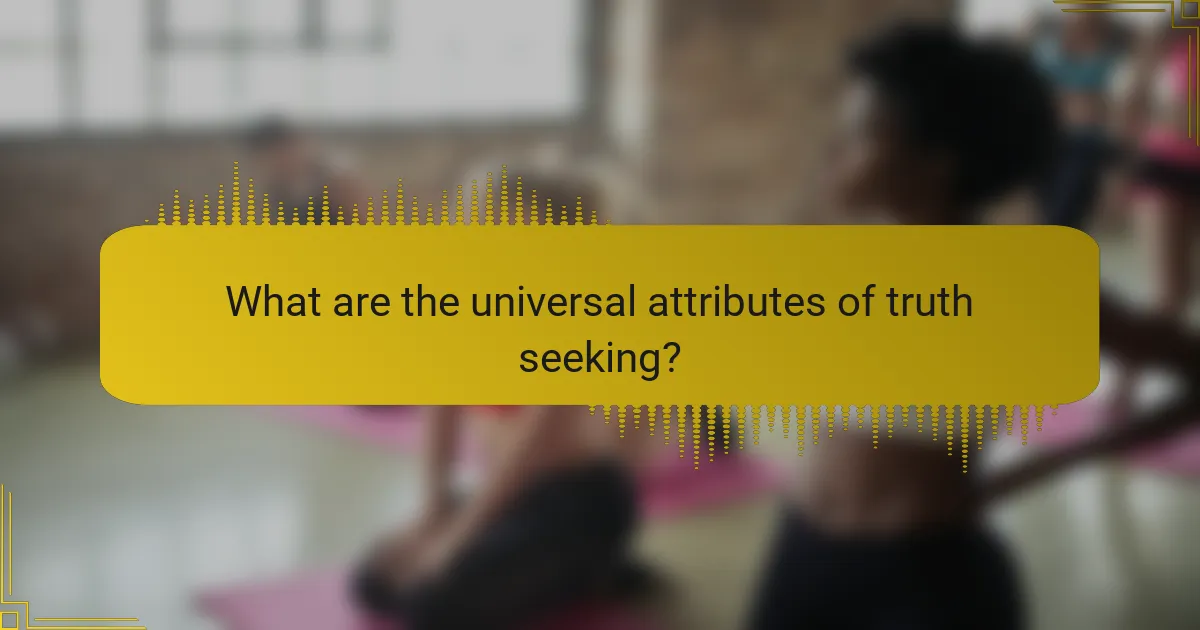
What are the universal attributes of truth seeking?
Truth seeking significantly influences mindfulness, resilience, and bio-hacking success. Key universal attributes include curiosity, open-mindedness, critical thinking, and a commitment to personal growth. Curiosity drives the desire for knowledge, while open-mindedness fosters acceptance of diverse perspectives. Critical thinking enables effective analysis of information, and commitment to personal growth encourages continuous self-improvement. These attributes collectively enhance an individual’s ability to navigate challenges and optimise well-being.
How does truth seeking manifest in everyday behaviour?
Truth seeking manifests in everyday behaviour through curiosity, open-mindedness, and critical thinking. Individuals who prioritise truth often engage in reflective practices, such as journaling or meditation, enhancing mindfulness. This behaviour fosters resilience by encouraging adaptability in the face of challenges. Additionally, truth seekers are more likely to experiment with bio-hacking techniques, optimising their physical and mental well-being. These actions reflect a commitment to personal growth and informed decision-making.
What are common misconceptions about truth seeking?
Common misconceptions about truth seeking include the belief that it is purely an intellectual pursuit, that it requires absolute certainty, and that it leads to conflict. Many assume truth seeking is only about gathering facts, neglecting its emotional and psychological dimensions. Additionally, some think that truth seekers must always be right, whereas the process often involves questioning and refining beliefs. Lastly, people may view truth seeking as a solitary journey, overlooking the collaborative nature of discovering deeper insights through dialogue and shared experiences.
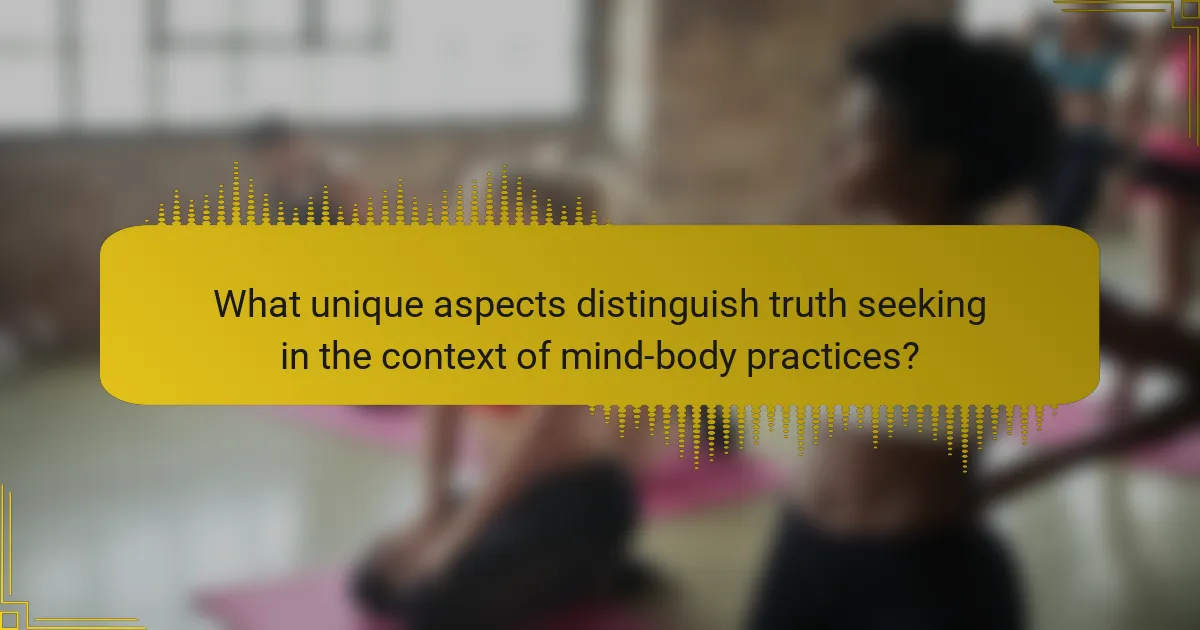
What unique aspects distinguish truth seeking in the context of mind-body practices?
Truth seeking is a unique personality aspect that enhances mindfulness and resilience in mind-body practices. It fosters a deeper understanding of self, leading to improved bio-hacking outcomes. Individuals who prioritise truth seeking often exhibit greater emotional regulation and adaptability, essential traits for navigating challenges. This intrinsic motivation drives them to explore and integrate diverse practices, ultimately promoting holistic well-being.
How does cultural background affect truth-seeking behaviour?
Cultural background significantly influences truth-seeking behaviour by shaping perceptions, values, and approaches to knowledge. Individuals from collectivist cultures may prioritise group consensus, affecting their willingness to explore personal truths. In contrast, those from individualistic cultures often emphasise personal experience and critical thinking. This divergence impacts mindfulness, resilience, and bio-hacking success, as truth-seeking is integral to self-awareness and growth. Understanding these cultural influences can enhance strategies for fostering resilience and mindfulness in diverse populations.
What unique challenges do truth seekers face in mindfulness?
Truth seekers face unique challenges in mindfulness, including cognitive dissonance, emotional overwhelm, and societal skepticism. These obstacles can hinder their ability to remain present and engaged. Cognitive dissonance arises when new insights conflict with established beliefs, creating internal tension. Emotional overwhelm can stem from confronting uncomfortable truths, leading to anxiety or avoidance. Societal skepticism often discourages open exploration of unconventional ideas, isolating truth seekers. Addressing these challenges requires resilience and adaptive strategies to cultivate mindfulness amidst adversity.
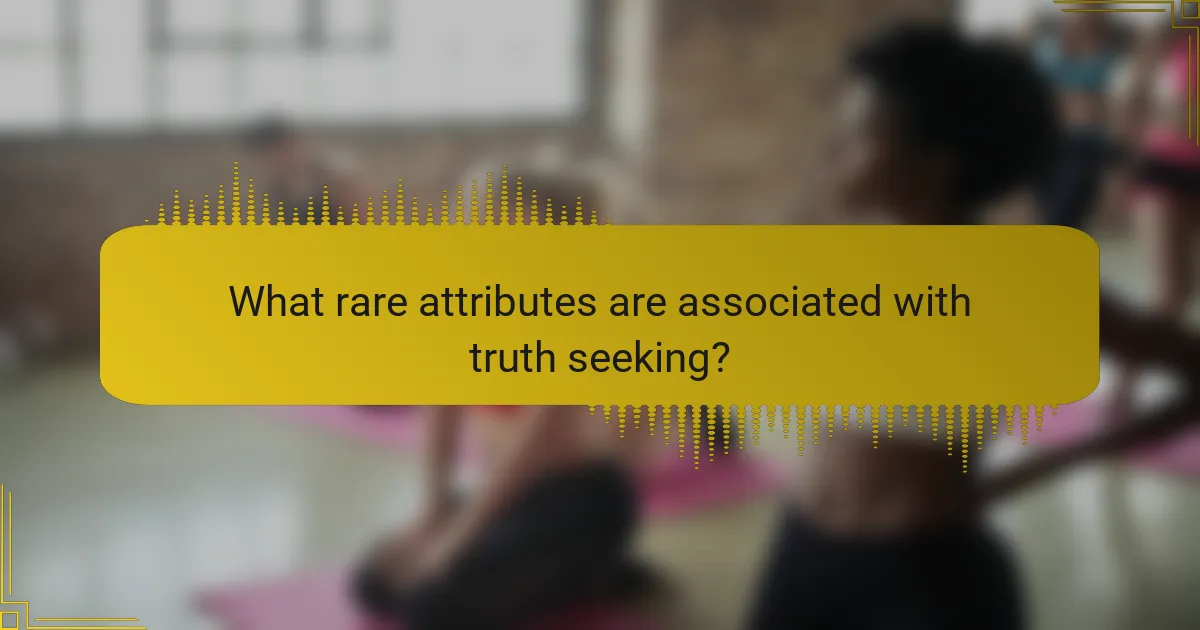
What rare attributes are associated with truth seeking?
Truth seeking is associated with rare attributes such as cognitive flexibility, open-mindedness, and a strong intrinsic motivation for knowledge. These attributes enhance mindfulness, resilience, and bio-hacking success by fostering adaptability and a willingness to explore unconventional ideas. Cognitive flexibility allows individuals to adjust their thinking in response to new information, while open-mindedness promotes acceptance of diverse perspectives. Strong intrinsic motivation drives persistent inquiry, leading to deeper understanding and personal growth.
What are the lesser-known benefits of truth seeking?
Truth seeking enhances mindfulness, resilience, and bio-hacking success through lesser-known benefits. It promotes self-awareness, enabling individuals to recognise and manage their thoughts and emotions effectively. This heightened awareness fosters resilience by encouraging adaptive coping strategies during challenges. Additionally, truth seeking cultivates a growth mindset, which is crucial for bio-hacking success as it drives continuous self-improvement and experimentation. Ultimately, these interconnected benefits create a solid foundation for personal growth and well-being.
How can truth seeking lead to unexpected breakthroughs in bio-hacking?
Truth seeking can lead to unexpected breakthroughs in bio-hacking by fostering a mindset that embraces experimentation and learning. This personality aspect enhances mindfulness and resilience, allowing individuals to adapt and innovate in their bio-hacking practices. By seeking truth, bio-hackers can uncover insights that challenge conventional wisdom, leading to novel approaches and improved outcomes. Engaging deeply with data and personal experiences cultivates a unique perspective that drives success in bio-hacking endeavours.
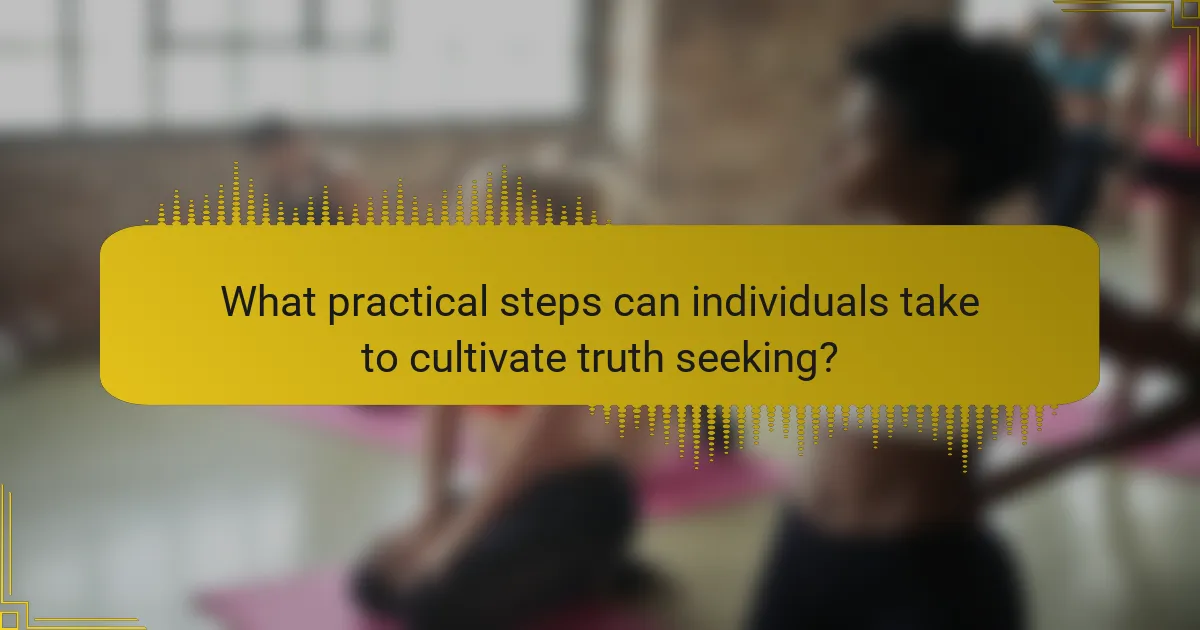
What practical steps can individuals take to cultivate truth seeking?
To cultivate truth seeking, individuals can adopt practical steps that enhance mindfulness, resilience, and bio-hacking success. First, engage in regular self-reflection to assess personal beliefs and biases. Second, practice active listening in conversations to understand diverse perspectives. Third, seek out credible sources of information and cross-verify facts. Fourth, create a supportive environment that encourages open dialogue about challenging topics. Fifth, embrace curiosity by asking questions and exploring new ideas. These steps foster a mindset conducive to truth seeking, ultimately benefiting personal growth and well-being.
What are the best practices for integrating truth seeking into daily life?
Integrating truth seeking into daily life enhances mindfulness, resilience, and bio-hacking success. Prioritise self-reflection to identify personal values and beliefs. Engage in open-minded discussions to challenge assumptions and broaden perspectives. Practice active listening to deepen understanding and foster connections. Incorporate daily journaling to track thoughts and insights, promoting clarity and awareness. Embrace continuous learning through reading and exploring diverse viewpoints, reinforcing a commitment to truth seeking.
What common mistakes should be avoided when pursuing truth seeking?
To effectively pursue truth seeking, avoid common mistakes that can hinder mindfulness, resilience, and bio-hacking success.
One major mistake is relying solely on subjective experiences without critical evaluation. This approach can lead to cognitive biases that distort understanding. Additionally, neglecting diverse perspectives limits the depth of insight gained.
Another error is becoming overly attached to specific beliefs or outcomes. This rigidity can obstruct personal growth and adaptability, which are essential for resilience.
Lastly, failing to integrate findings into daily practices undermines the potential benefits of truth seeking. Consistent application of insights enhances mindfulness and bio-hacking success.
How can truth seeking be measured or assessed effectively?
Truth seeking can be effectively measured through self-report questionnaires and behavioural assessments. These tools evaluate cognitive styles, openness to experience, and critical thinking skills. Research indicates that higher truth-seeking correlates with greater mindfulness and resilience. For instance, the Truth-Seeking Scale can quantify an individual’s propensity for seeking objective truth. Additionally, bio-hacking success is often linked to the truth-seeking mindset, as it encourages informed decision-making about health and wellness practices. Assessing truth seeking provides insights into personal growth and adaptability in various contexts.